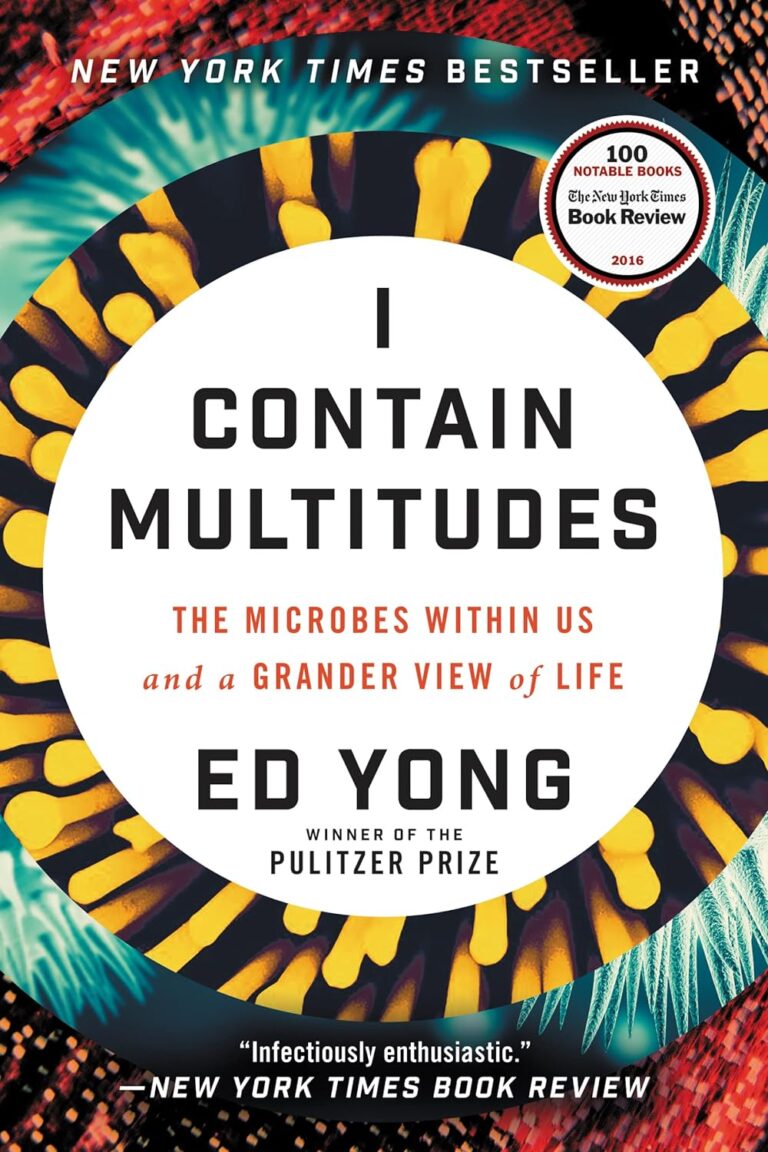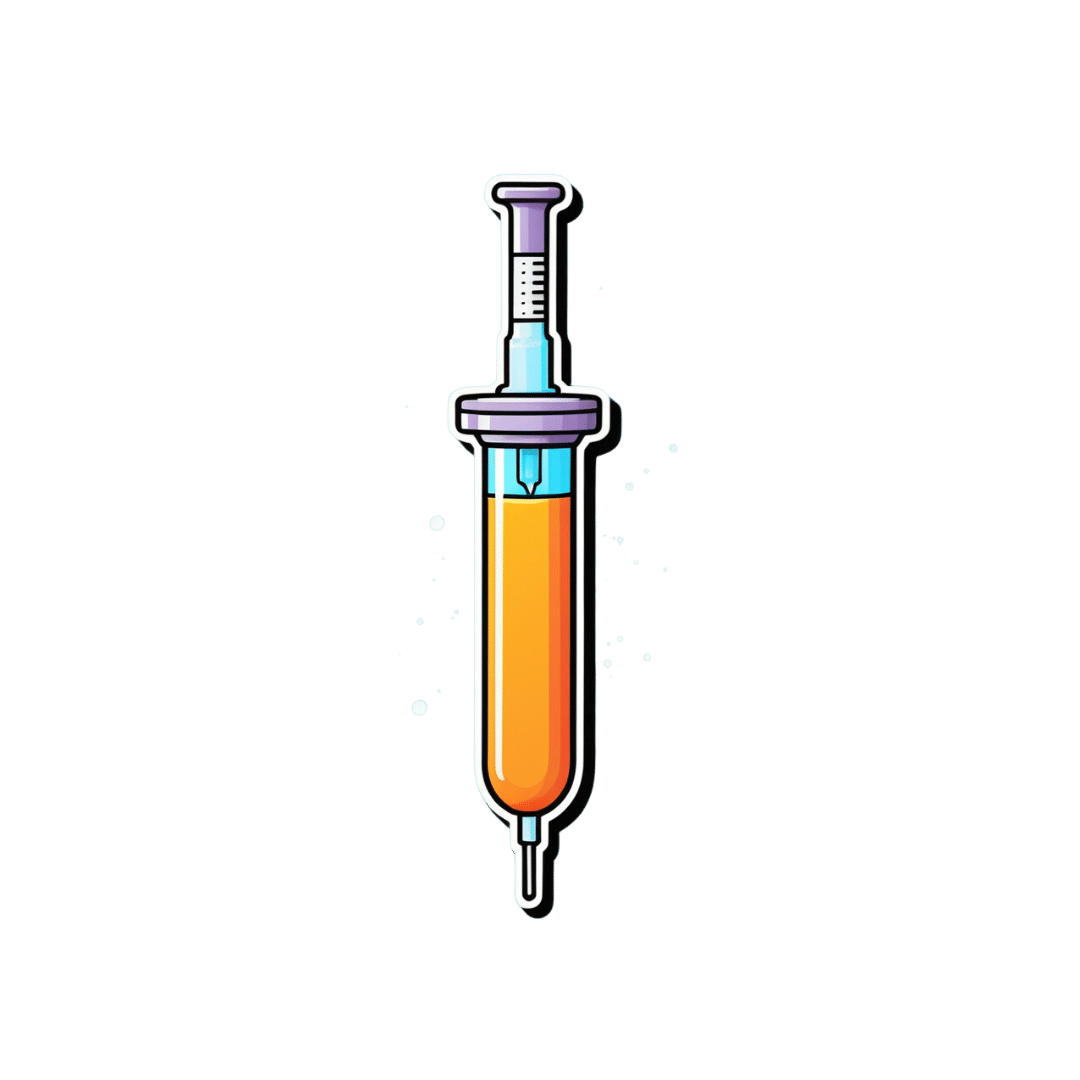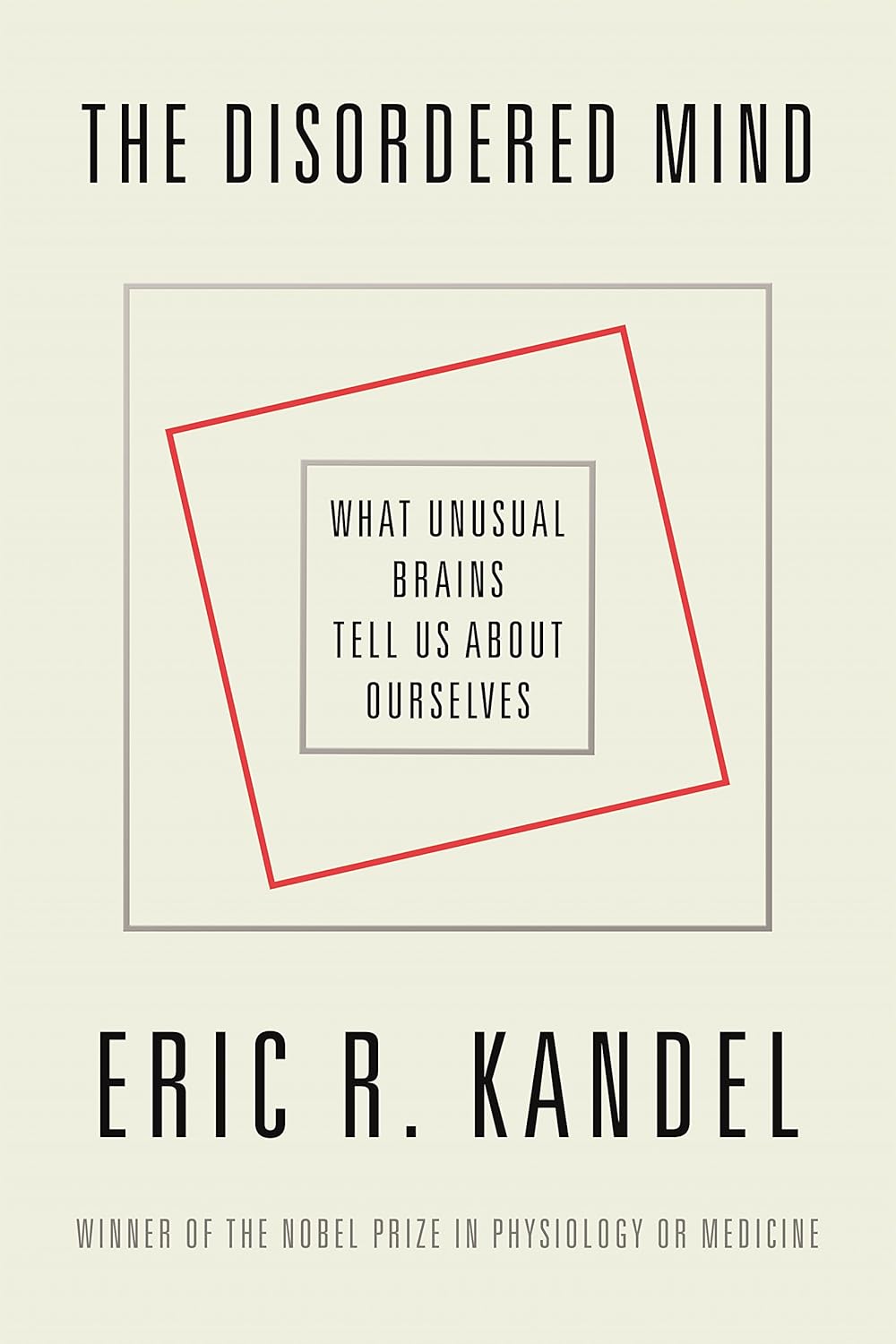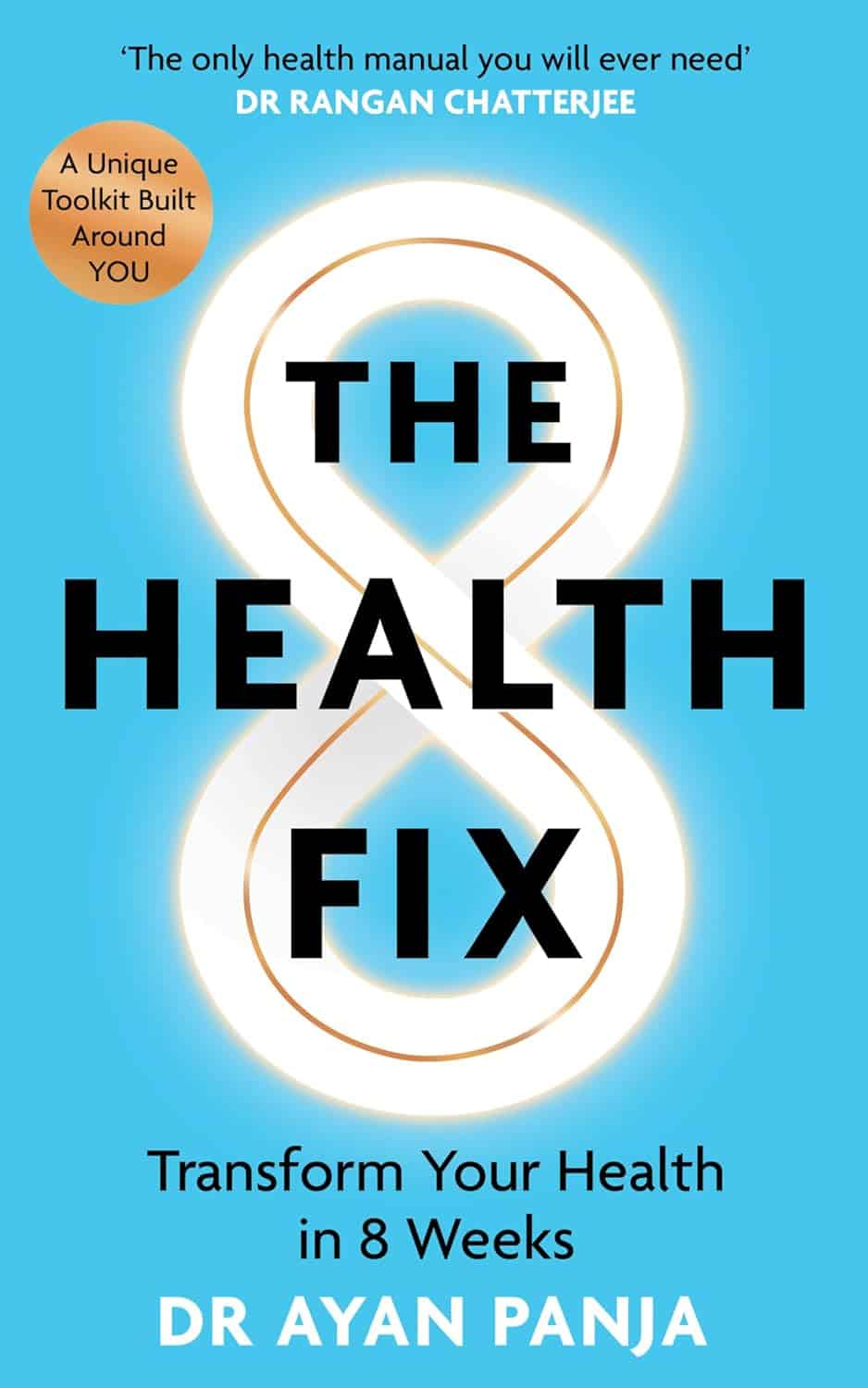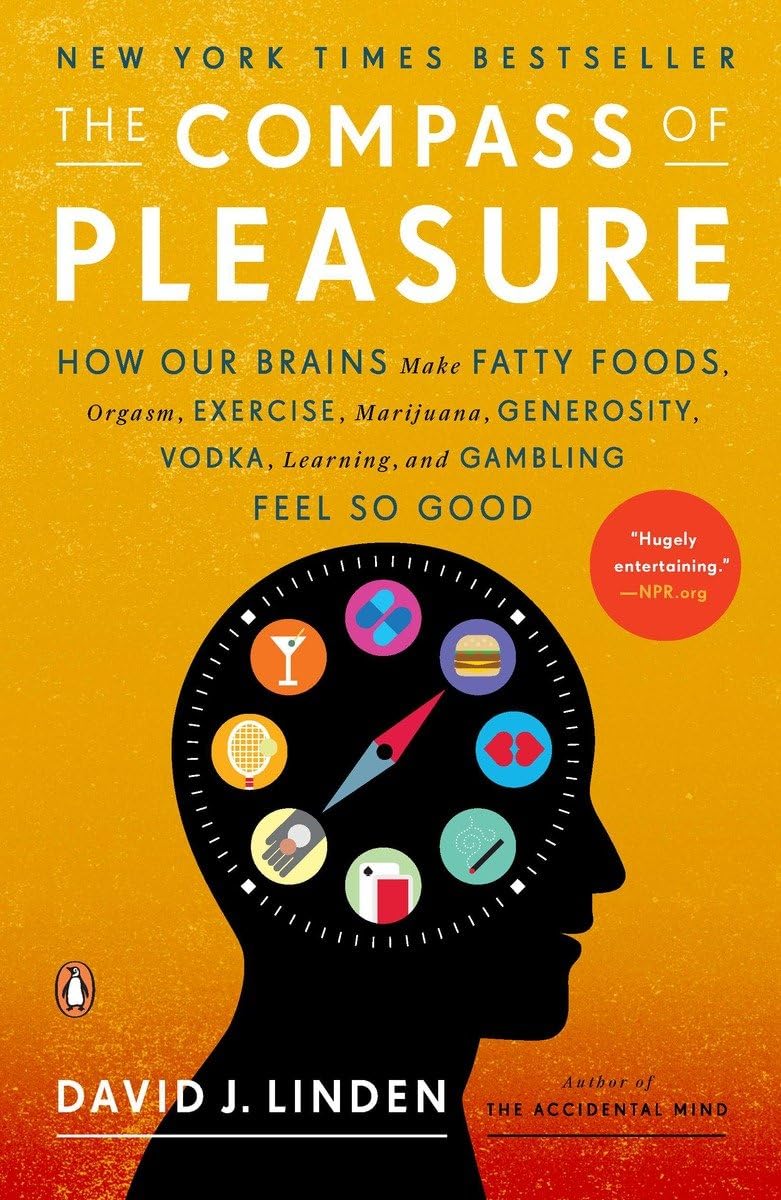
The Compass of Pleasure – by Dr. David Linden
10almonds is reader-supported. We may, at no cost to you, receive a portion of sales if you purchase a product through a link in this article.
There are a lot of books about addiction, so what sets this one apart?
Mostly, it’s that this one maintains that addiction is neither good nor bad per se—just, some behaviors and circumstances are. Behaviors and circumstances caused, directly or indirectly, by addiction.
But, Dr. Linden argues, not every addiction has to be so. Especially behavioral addictions; the rush of dopamine one gets from a good session at the gym or learning a new language, that’s not a bad thing, even if they can fundamentally be addictions too.
Similarly, we wouldn’t be here as a species without some things that rely on some of the same biochemistry as addictions; orgasms and eating food, for example. Yet, those very same urges can also inconvenience us, and in the case of foods and other substances, can harm our health.
In this book, the case is made for shifting our addictive tendencies to healthier addictions, and enough information is given to help us do so.
Bottom line: if you’d like to understand what is going on when you get waylaid by some temptation, and how to be tempted to better things, this book can give the understanding to do just that.
Click here to check out The Compass of Pleasure, and make yours work in your favor!
Don’t Forget…
Did you arrive here from our newsletter? Don’t forget to return to the email to continue learning!
Recommended
Learn to Age Gracefully
Join the 98k+ American women taking control of their health & aging with our 100% free (and fun!) daily emails:
-
Yes, we still need chickenpox vaccines
10almonds is reader-supported. We may, at no cost to you, receive a portion of sales if you purchase a product through a link in this article.
For people who grew up before a vaccine was available, chickenpox is largely remembered as an unpleasant experience that almost every child suffered through. The highly contagious disease tore through communities, leaving behind more than a few lasting scars.
For many children, chickenpox was much more than a week or two of itchy discomfort. It was a serious and sometimes life-threatening infection.
Prior to the chickenpox vaccine’s introduction in 1995, 90 percent of children got chickenpox. Those children grew into adults with an increased risk of developing shingles, a disease caused by the same virus—varicella-zoster—as chickenpox, which lies dormant in the body for decades.
The vaccine changed all that, nearly wiping out chickenpox in the U.S. in under three decades. The vaccine has been so successful that some people falsely believe the disease no longer exists and that vaccination is unnecessary. This couldn’t be further from the truth.
Vaccination spares children and adults from the misery of chickenpox and the serious short- and long-term risks associated with the disease. The CDC estimates that 93 percent of children in the U.S. are fully vaccinated against chickenpox. However, outbreaks can still occur among unvaccinated and under-vaccinated populations.
Here are some of the many reasons why we still need chickenpox vaccines.
Chickenpox is more serious than you may remember
For most children, chickenpox lasts around a week. Symptoms vary in severity but typically include a rash of small, itchy blisters that scab over, fever, fatigue, and headache.
However, in one out of every 4,000 chickenpox cases, the virus infects the brain, causing swelling. If the varicella-zoster virus makes it to the part of the brain that controls balance and muscle movements, it can cause a temporary loss of muscle control in the limbs that can last for months. Chickenpox can also cause other serious complications, including skin, lung, and blood infections.
Prior to the U.S.’ approval of the vaccine in 1995, children accounted for most of the country’s chickenpox cases, with over 10,000 U.S. children hospitalized with chickenpox each year.
The chickenpox vaccine is very effective and safe
Chickenpox is an extremely contagious disease. People without immunity have a 90 percent chance of contracting the virus if exposed.
Fortunately, the chickenpox vaccine provides lifetime protection and is around 90 percent effective against infection and nearly 100 percent effective against severe illness. It also reduces the risk of developing shingles later in life.
In addition to being incredibly effective, the chickenpox vaccine is very safe, and serious side effects are extremely rare. Some people may experience mild side effects after vaccination, such as pain at the injection site and a low fever.
Although infection provides immunity against future chickenpox infections, letting children catch chickenpox to build up immunity is never worth the risk, especially when a safe vaccine is available. The purpose of vaccination is to gain immunity without serious risk.
The chickenpox vaccine is one of the greatest vaccine success stories in history
It’s difficult to overstate the impact of the chickenpox vaccine. Within five years of the U.S. beginning universal vaccination against chickenpox, the disease had declined by over 80 percent in some regions.
Nearly 30 years after the introduction of the chickenpox vaccine, the disease is almost completely wiped out. Cases and hospitalizations have plummeted by 97 percent, and chickenpox deaths among people under 20 are essentially nonexistent.
Thanks to the vaccine, in less than a generation, a disease that once swept through schools and affected nearly every child has been nearly eliminated. And, unlike vaccines introduced in the early 20th century, no one can argue that improved hygiene, sanitation, and health helped reduce chickenpox cases beginning in the 1990s.
Having chickenpox as a child puts you at risk of shingles later
Although most people recover from chickenpox within a week or two, the virus that causes the disease, varicella-zoster, remains dormant in the body. This latent virus can reactivate years after the original infection as shingles, a tingling or burning rash that can cause severe pain and nerve damage.
One in 10 people who have chickenpox will develop shingles later in life. The risk increases as people get older as well as for those with weakened immune systems.
Getting chickenpox as an adult can be deadly
Although chickenpox is generally considered a childhood disease, it can affect unvaccinated people of any age. In fact, adult chickenpox is far deadlier than pediatric cases.
Serious complications like pneumonia and brain swelling are more common in adults than in children with chickenpox. One in 400 adults who get chickenpox develops pneumonia, and one to two out of 1,000 develop brain swelling.
Vaccines have virtually eliminated chickenpox, but outbreaks still happen
Although the chickenpox vaccine has dramatically reduced the impact of a once widespread disease, declining immunity could lead to future outbreaks. A Centers for Disease Control and Prevention analysis found that chickenpox vaccination rates dropped in half of U.S. states in the 2022-2023 school year compared to the previous year. And more than a dozen states have immunization rates below 90 percent.
In 2024, New York City and Florida had chickenpox outbreaks that primarily affected unvaccinated and under-vaccinated children. With declining public confidence in routine vaccines and rising school vaccine exemption rates, these types of outbreaks will likely become more common.
The CDC recommends that children receive two chickenpox vaccine doses before age 6. Older children and adults who are unvaccinated and have never had chickenpox should also receive two doses of the vaccine.
For more information, talk to your health care provider.
This article first appeared on Public Good News and is republished here under a Creative Commons license.
Share This Post
-
The Most Anti Aging Exercise
10almonds is reader-supported. We may, at no cost to you, receive a portion of sales if you purchase a product through a link in this article.
We’ve referenced this (excellent) video before, but never actually put it under the spotlight in one of these features, so here we go!
Deep squats
It’s about deep squats, also called Slav squats, Asian squats, sitting squats, resting squats, or various other names. However, fear not; you don’t need to be Slavic or Asian to do it; you just need to practice.
As for why this is called “anti-aging”, by the way, it’s because being able to get up off the ground is one of the main tests of age-related mobility decline, and if you can deep-squat comfortably, then you can do that easily. And so long as you continue being able to deep-squat comfortably, you’ll continue to be able to get up off the ground easily too, because you have the strength in the right muscles, as well as the suppleness, comfort with range of motion, and balance (those stabilizing muscles are used constantly in a deep squat, whereas Western lifestyle sitting leaves those muscles very neglected and thus atrophied).
Epidemiological note: chairs, couches, and assorted modern conveniences reduce the need for squatting in daily life, leading to stiffness in joints, muscles, tendons, and ligaments. Many adults in developed countries struggle with deep squats due to lack of use, not aging. Which is a problem, because a lack of full range of motion in joints causes wear and tear, leading to chronic pain and degenerative joint diseases. People in countries where squatting is a common resting position have lower incidences of osteoarthritis, for example—contrary to what some might expect, squatting does not harm joints but rather protects them from arthritis and knee pain. Strengthening leg muscles through squatting can alleviate knee pain, whereas knee pain is often worsened by inactivity.
Notwithstanding the thumbnail, which is showing an interim position, one’s feet should be flat on the ground, by the way, and one’s butt should be nearby, just a few inches off the ground (in other words, the position that we see her in for most of this video).
Troubleshooting: if you’re accustomed to sitting in chairs a lot, then this may be uncomfortable at first. Zuzka advises us to go gently, and/but gradually increase our range of motion and (equally importantly) duration in the resting position.
You can use a wall or doorway to partially support you, at first, if you struggle with mobility or balance. Just try to gradually use it less, until you’re comfortable deep-squatting with no support.
Since this is not an intrinsically very exciting exercise, once you build up the duration for which you’re comfortable deep-squatting, it can be good to get in the habit of “sitting” this way (i.e. deep squatting, still butt-off-the-floor, but doing the job of sitting) while doing other things such as working (if you have an appropriate work set-up for that*), reading, or watching TV.
*this is probably easiest with a laptop placed on an object/surface of appropriate height, such as a coffee table or such. As a bonus, having your hands in front of you while working will also bring your center of gravity forwards a bit, making the position easier and more comfortable to maintain. This writer (hi, it’s me) prefers her standing desk for work in general, with a nice ergonomic keyboard and all that, but if using a laptop from time to time, then squatting is a very good option.
In terms of working up duration, if you can only manage seconds to start with, that’s fine. Just do a few more seconds each time, until it’s 30, 60, 120, and so on until it’s 5 minutes, 10, 15, and so on.
You can even start that habit-forming while you’re still in the “seconds at a time” stage! You can deep-squat just for some seconds while you:
- pick up something from the floor
- check on something in the oven
- get something out of the bottom of the fridge
…etc!
For more on all this, plus many visual demonstrations including interim exercises to get you there if it’s difficult for you at first, enjoy:
Click Here If The Embedded Video Doesn’t Load Automatically!
Want to learn more?
You might also like to read:
Mobility For Now & For Later: Train For The Marathon That Is Your Life!
Take care!
Share This Post
-
Eat To Avoid (Or Beat) PCOS
10almonds is reader-supported. We may, at no cost to you, receive a portion of sales if you purchase a product through a link in this article.
Polycystic ovary syndrome, PCOS, affects very many people; around 1 in 5 women. It can show up unexpectedly, and usually the first-identified sign is irregular vaginal bleeding. We say “vaginal” rather than “menstrual” as it’s not technically menses, although it’ll look (and can feel) the same.
Like many “affects mostly women” conditions, science’s general position is “we don’t know what causes it or how to cure it”.
Quick book recommendation before we continue:
Unwell Women: Misdiagnosis and Myth in a Man-Made World – by Dr. Elinor Cleghorn
…is a top-tier book about medical misogyny. We’d say more here, but well, you can read our review there 🙂
What doesn’t work
Since PCOS is characterized by excessive androgen production, it is reasonable to expect that foods containing phytoestrogens (such as soy) may help. They won’t. The human body can’t use those as estrogen, and in fact, consuming unusually large quantities of phytoestrogens can actually get in the way of your own (or bioidentical) estrogen, by competing for the same receptors but not really doing the job.
But, you won’t get that problem from moderate consumption of soy; the warning is more for those tempted to self-medicate with megadoses, or are opting for dubious supplements such as Pueraria mirifica ← will have to do a research review on that one of these days, but suffice it to say meanwhile, it has some serious drawbacks
See also: What Does “Balance Your Hormones” Even Mean?
What can work
There are some supplement-based approaches that actually can help, and those are the ones that rather than trying to manufacture estrogen out of thin air, work to reduce testosterone and/or reduce the conversion of free testosterone to its more potent form, dihydrogen testosterone (DHT); here are two examples:
- Licorice, Digestion, & Hormones
- One Man’s Saw Palmetto Is Another Woman’s Serenoa Repens ← this one has the most evidence of the two
What will work
…or at least, barring additional confounding factors, what the evidence strongly supports working. Here’s where we get into diet properly, and there are three main dietary approaches:
Low-GI diet: focus on high-fiber, low-carb foods (e.g. whole grains, legumes, berries, leafy greens). Eating this way results in improved insulin sensitivity, lower fasting insulin, cholesterol, triglycerides, waist circumference, and (for women) yes, lower testosterone levels.
See: What Do The Different Kinds Of Fiber Do? 30 Foods That Rank Highest
High antioxidant diet: focus on foods rich in antioxidants (e.g. vitamin A, α-tocopherol specifically, vitamins C and D, and polyphenols) as these lower PCOS incidence.
See: 21 Most Beneficial Polyphenols & What Foods Have Them
Ketogenic diet: focus on high-fat, very low-carb foods (e.g. fatty fish, dairy, leafy greens). This significantly reduces androgen levels, improves insulin sensitivity, and regulates hormones. But… It’s recommended for short-term use only due to its negative health impacts from poor (i.e. narrow) nutritional coverage:
See: Ketogenic Diet: Burning Fat, Or Burning Out?
It is also reasonable to supplement, for example:
❝Omega-3 fatty acids and vitamin D have powerful anti-inflammatory and antioxidant properties that significantly improve insulin sensitivity and reduce androgen levels in metabolic syndromes like PCOS. A higher intake of omega-3 and vitamin E also alleviates mental health parameters and gene expression of PPAR-γ, IL-8, and TNF-α in women with PCOS.
Dietary supplements, such as antioxidants like N-acetylcysteine (NAC), vitamin D, inositol, and omega-3 fatty acids, and mineral supplements (zinc, magnesium selenium, and chromium) help in reducing insulin resistance. These supplements also enhance ovulatory function and decrease inflammation in PCOS patients.
Omega-3 fatty acid supplements improve biochemical parameters LH, LH/FSH, lipid profiles, and adiponectin levels and regularize the menstrual cycle in women with PCOS. A recent RCT also indicated that probiotic/symbiotic supplementation significantly improves triglyceride, insulin, and HDL levels in women with PCOS.❞
Source: The Role of Lifestyle Interventions in PCOS Management: A Systematic Review
Want to know more?
You might like this book that we reviewed a little while back:
PCOS Repair Protocol – by Tamika Woods
Take care!
Share This Post
Related Posts
-
The Disordered Mind – by Dr. Eric Kandel
10almonds is reader-supported. We may, at no cost to you, receive a portion of sales if you purchase a product through a link in this article.
We don’t generally include author bios in these reviews, but it’s worth mentioning that Dr. Kandel won the Nobel Prize in Physiology/Medicine, for studies related to the topics in this book.
The premise in this book is as per the subtitle: what unusual brains tell us about ourselves. He assumes that the reader has a “usual” brain, but if you don’t, then all is not lost, and in fact he probably talks about your brain in the book too.
Examining the brains of people with conditions ranging from autism to Alzheimer’s, schizophrenia to Parkinson’s, or even such common things as depression and anxiety and addiction, tells us a lot about what in our brain (anatomically and physiologically) is responsible for what, and how those things can be thrown out of balance.
By inference, that also tells us how to keep things from being thrown out of balance. Even if the genetic deck is stacked against you, there are still things that can be done to avoid actual disease. After all, famously, “genes load the gun, but lifestyle pulls the trigger”.
Dr. Kandel writes in a clear and lucid fashion, such that even the lay reader can quite comfortably learn about such things as prion-folding and inhibitory neurons and repressed transcription factors and more.
Bottom line: if you’d like to understand more about what goes wrong and how and why and what it means for your so-far-so-good healthy brain, this is the book for that.
Click here to check out The Disordered Mind, and understand more!
Don’t Forget…
Did you arrive here from our newsletter? Don’t forget to return to the email to continue learning!
Learn to Age Gracefully
Join the 98k+ American women taking control of their health & aging with our 100% free (and fun!) daily emails:
-
The Health Fix – by Dr. Ayan Panja
10almonds is reader-supported. We may, at no cost to you, receive a portion of sales if you purchase a product through a link in this article.
The book is divided into three main sections:
- The foundations
- The aspirations
- The fixes
The foundations are an overview of the things you’re going to need to know, about biology, behaviors, and being human.
The aspirations are research-generated common hopes, desires, dreams and goals of patients who have come to Dr. Panja for help.
The fixes are exactly what you’d hope them to be. They’re strategies, tools, hacks, tips, tricks, to get you from where you are now to where you want to be, health-wise.
The book is well-structured, with deep-dives, summaries, and practical advice of how to make sure everything you’re doing works together as part of the big picture that you’re building for your health.
All in all, a fantastic catch-all book, whatever your health goals.
Don’t Forget…
Did you arrive here from our newsletter? Don’t forget to return to the email to continue learning!
Learn to Age Gracefully
Join the 98k+ American women taking control of their health & aging with our 100% free (and fun!) daily emails:
-
Hair-Loss Remedies, By Science
10almonds is reader-supported. We may, at no cost to you, receive a portion of sales if you purchase a product through a link in this article.
10almonds Gets Hairy
Hair loss is a thing that at some point affects most men and a large minority of women. It can be a source of considerable dysphoria for both, as it’s often seen as a loss of virility/femininity respectively, and is societally stigmatized in various ways.
Today we’re going to focus on the most common kind: androgenic alopecia, which is called “male pattern baldness” in men and “female pattern baldness” in women, despite being the same thing.
We won’t spend a lot of time on the science of why this happens (we’re going to focus on the remedies instead), but suffice it to say that genes and hormones both play a role, with dihydrogen testosterone (DHT) being the primary villain in this case.
We’ve talked before about the science of 5α-reductase inhibitors to block the conversion of regular testosterone* to DHT, its more potent form:
One Man’s Saw Palmetto Is Another Woman’s Serenoa Repens…
*We all make this to a greater or lesser degree, unless we have had our ovaries/testes removed.
Finasteride
Finasteride is a 5α-reductase inhibitor that performs similarly to saw palmetto, but comes in tiny pills instead of needing to take a much higher dose of supplement (5mg of finasteride is comparable in efficacy to a little over 300mg of saw palmetto).
Does it work? Yes!
Any drawbacks? A few:
- It’ll take 3–6 months to start seeing effects. This is because of the hormonal life-cycle of human hairs.
- Common side-effects include ED.
- It is popularly labelled/prescribed as “only for men”
On that latter point: the warnings about this are severe, detailing how women must not take it, must not even touch it if it has been cut up or crushed.
However… That’s because it can carry a big risk to our unborn fetuses. So, if we are confident we definitely don’t have one of those, it’s not actually applicable to us.
That said, finasteride’s results in women aren’t nearly so clear-cut as in men (though also, there has been less research, largely because of the above). Here’s an interesting breakdown in more words than we have room for here:
Finasteride for Women: Everything You Need to Know
Spironolactone
This one’s generally prescribed to women, not men, largely because it’s the drug sometimes popularly known as a “chemical castration” drug, which isn’t typically great marketing for men (although it can be applied topically, which will have less of an effect on the rest of the body). For women, this risk is simply not an issue.
We’ll be brief on this one, but we’ll just drop this, so that you know it’s an option that works:
❝Spironolactone is an effective and safe treatment of androgenic alopecia which can enhance the efficacy when combined with other conventional treatments such as minoxidil.
Topical spironolactone is safer than oral administration and is suitable for both male and female patients, and is expected to become a common drug for those who do not have a good response to minoxidil❞
Minoxidil
This one is available (to men and women) without prescription. It’s applied topically, and works by shortcutting the hair’s hormonal growth cycle, to reduce the resting phase and kick it into a growth phase.
Does it work? Yes!
Any drawbacks? A few:
- Whereas you’ll remember finasteride takes 3–6 months to see any effect, this one will have an effect very quickly
- Specifically, the immediate effect is: your rate of hair loss will appear to dramatically speed up
- This happens because when hairs are kicked into their growth phase if they were in a resting phase, the first part of that growth phase is to shed each old hair to make room for the new one
- You’ll then need the same 3–6 months as with finasteride, to see the regrowth effects
- If you stop using it, you will immediately shed whatever hair you gained by this method
Why do people choose this over finasteride? For one of three reasons, mainly:
- They are women, and not offered finasteride
- They are men, and do not want the side effects of finasteride
- They just saw an ad and tried it
As to how it works:
Some final notes:
There are some other contraindications and warnings with each of these drugs by the way, so do speak with your doctor/pharmacist. For example:
- Finasteride can tax the liver a little
- Spironolactone can reduce bone turnover
- Minoxidil is a hypotensive; this shouldn’t be an issue for most people, but for some people it could be a problem
There are other hair loss remedies and practices, but the above three are the heavy-hitters, so that’s what we spent our time/space on today. We’ll perhaps cover the less powerful (but less risky) options one of these days.
Meanwhile, take care!
Don’t Forget…
Did you arrive here from our newsletter? Don’t forget to return to the email to continue learning!
Learn to Age Gracefully
Join the 98k+ American women taking control of their health & aging with our 100% free (and fun!) daily emails:

